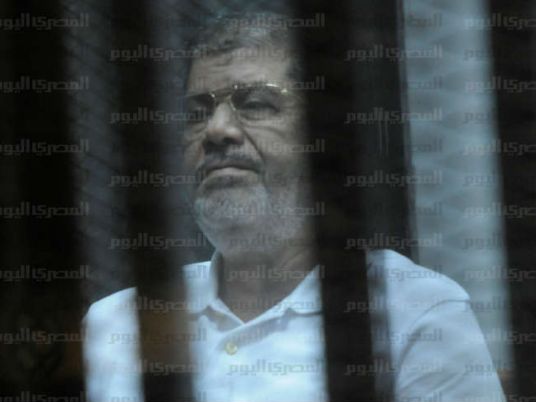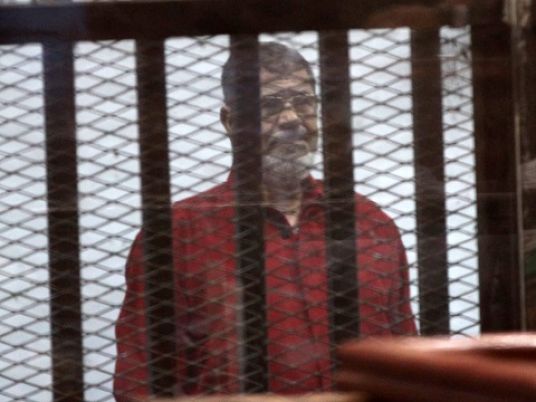“Article 6 [of the 22 November Constitutional Declaration] aims to ensure the country’s safety against irresponsible actions by some groups, and the constitutional declaration will expire once the referendum result is announced. I invite all political forces, revolutionary youths, and legal experts for a fruitful dialogue on Saturday," President Mohamed Morsy told the nation on state TV Thursday night, in response to bloody clashes between his supporter and opponents outside his presidential palace on Wednesday left more than five dead.
Despite the president's attempts to calm the conflict, reactions to the speech by politicians and representatives of civilian groups have been broadly negative. Some called the speech shallow, failing to address the two major demands of the opposition: rescinding the presidential decree that shields Morsy's decisions from judicial oversight or challenges; and postponing the constitutional referendum scheduled for 15 December, due in part to the withdrawal by nearly 15 secularist and Coptic representatives from the Islamist-dominated Constituent Assembly. Those withdrawals had potentially created a legal grounds for annulling the assembly’s legitimacy, but such an action was averted by Morsy’s declaration, which protected the assembly from dissolution.
Abdallah al-Sennawy, mouthpiece of the Arab Nasserist Party and chief editor of the party's Al-Arabi newspaper, said Morsy’s invitation to meet with the opposition was not a new idea.
“Morsy’s invitation for dialogue will not be accepted by civil forces. The constitutional declaration is still in place, the referendum will be held as scheduled," he said.
The National Salvation Front, an alliance of civil forces led by Mohamed ElBaradei, Hamdeen Sabbahi and Amr Moussa, said in a statement released prior to the speech that it demands the declaration be cancelled, the constitutional referendum postponed, that members of the Muslim Brotherhood be investigated for assaults on secular activists, and for massive demonstrations on Friday to voice those demands under the motto “the Red Card."
“We will not attend the Saturday meeting," Abdel Ghaffar Shokr, chairman of the Socialist Popular Alliance Party and a member of the front, told Egypt Independent. “This is a mockery of the demands. The constitutional declaration means there are exceptional circumstances in the country that grant the president dictatorial immunity. A bigger problem is that the referendum will still run on time, though the constitution includes several contentious provisions. The document has to gain consensus before voting on it."
Hassan Nafaa, a political science professor at Cairo University, says the call for a dialogue did not involve a clear agenda. “The invitation did not name the forces who are invited," Nafaa told state TV following the speech. “The president talked about the election system and appointing Shura Council members, which are already stipulated in Article 128 of the draft constitution. Does that mean that some articles may be amended? I do not think so."
The article stipulates that the council, composed of a minimum of 150 members, be elected through direct, secret polls. The president may appoint no more than ten percent of members. But Sennawy believes that by talking about the Shura Council, Morsy was trying to tempt the opposition with the lure of council memberships. The 30 March 2011 Constitutional Declaration entitles the president to appoint one third of the Shura Council members, a power he has not yet used.
Morsy could be offering membership in the council that would be elected in March, Sennawy said, explaining that Article 128 of the new constitution would only go into force for the elections that follow.
Sennawy claimed that Morsy’s suggestion to cancel Article 6 of his constitutional declaration, which entitles the president to adopt any measures necessary to confront dangers to the revolution and national unity, is meaningless. Sennawy said the law on criminal procedures includes provisions on granting the president special powers when addressing dangers to the country, whether terrorist or political. Therefore, cancelling the article would not represent a turning point in the dialogue with the opposition.
Reviving a tradition often adopted by the ousted regime as well as by the Supreme Council of the Armed Forces during their rule in the transitional period, Morsy implied that opposition protesters involved in Wednesday’s clashes were paid “thugs."
Hussein Abdel Ghany, spokesperson for the Salvation Front, told state TV that Morsy behaved like former President Anwar al-Sadat during the latest days of his presidency. In September 1981, Sadat detained 1,000 opposition politicians and intellectuals, a move that marked the beginning of the end of his rule.


